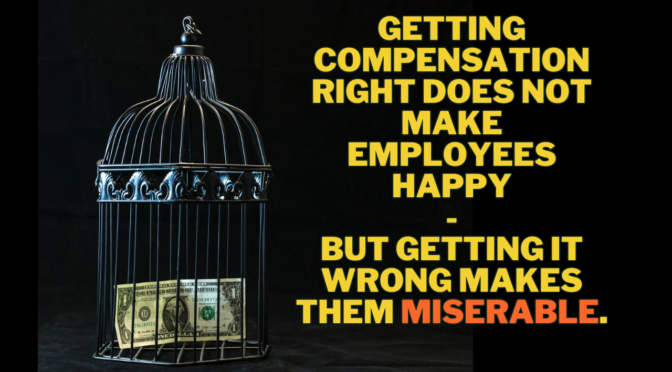I’m very proud to announce the first international forum on happiness at work, September 7-9 in Copenhagen.
-
Quote
In every substantive sense, employees of a company carry more risks than do the shareholders. Also, their contributions of knowledge, skills and entrepreneurship are typically more important than the contributions of capital by shareholders, a pure commodity that is perhaps in excess supply.
– Sumantra Ghoshal
-
Book review: Happiness: Lessons From a New Science
Money will not make you happy, unless you’re very poor, in which case a little money goes a long way. And yet individuals and societies seem to regard increased spending as the only reliable measure of success, and the main goal of most governments is to achieve an economic growth rate that beats out that of comparable countries. In Happiness: Lessons From a New Science economist Richar Layard argues that this is a totally wrong approach, which will not improve people’s lives. As an example consider indonesia where the average annual income is less than 1/10 of that of the US – but where people are just as happy.
Layard draws much inspiration from the philosopher Jeremy Bentham who had it right as far back as the 1800’s when he said that “The greatest happiness of the greatest number is the foundation of morals and legislation”. The goal of the individual is to be happy, this has been known since Aristotle who said that whatever else we desire, we want it because we expect it to make us happier. Therefore happiness is the underlying “why” of all human activity – including constructing and governing societies.
So what can a society do to make its people happier? Layard mentions the 7 factors that have been shown to have the greatest influence on people’s happiness:
* family relationships
* financial situation
* work
* community and friends
* health
* personal freedom
* personal valuesIt’s interesting to note, that an economic policy that seeks to encourage people to work more, eg. lowering taxes or increasing the mobility of the work force, will in fact decrease people’s situation in several of these areas and thus make people less happy.
One country has in fact acted on this: In Bhutan, a tiny nation in the Himalayas, King Jigme Singye Wangchuck decreed that “Gross national happiness is more important than gross national product [because] happiness takes precedence over economic prosperity in our national development process.” I feel quite sure that more countries will come to make similar decisions. Western materialist culture has made us happy over the last few decades, but constantly increasing consumerism has probably taken us as far as it possibly can happiness-wise. We will not be happier because we can buy more or bigger cars, TV’s and houses. More time and an increased ability to enjoy time with our friends, families and communities is a whole different matter, and this is where society needs to focus.
Layard’s is the most cogent and readable book on happiness on a national and global scale, and seeing as Layard is an economist rather than a psychologist, most of it is based on hard-core numbers and statistics. Layard’s main point is that happiness can be objectively quantified in individuals and in socities and can thus be used as a measure of success. I wish every political leader would read it – I think I’ll send our prime minister a copy :o)
-
Top 10 happy workplaces
In a comment to an earlier post about Chief Happiness Officers Kristian asked me for my Top 10 list of companies that make for happy employees. So without further ado, here’s my Top 10 happy companies list:
10. jetBlue – for emphasizing fun
9. Irma – for putting people first (in danish)
8. Pixar – for the cool offices (in danish, bottom of the page)
7. Patagonia – for being cool about surfing on company time
6. Pike Place Fish – for throwing fish around
5. IKEA Denmark – for giving their lowest paid employees a 20% pay hike
4. ServiceGruppen – for listening and learning (in danish)
3. Southwest Airlines – for emphasizing love
2. Kjaer Group – for loving cars, people and lifeAnd the number one company to be happy at:
1. Any company where YOU yourself are willing to make a difference and make yourself and others happy.
-
Truth and meaning
Here’s a thought:
Truth is something you find. Meaning is something you create.
Because a truth you’ve just created, can hardly be said to be a truth. Truth is something you find outside of yourself.
And because meaning that comes to you from outside of you does not mesure up to meaning you create yourself for yourself from what happens around you.
And it just struck me, that if the meaning you create for yourself is not based on truth it must be a flimsy and vulnerable thing indeed.
Or what do you think?
-
Pay by ethics
There’s a new trend in rewarding senior executives, namely to decide their pay based not only on financial performance but also on other “softer” measures. Here’s an example:
Calvert, the nation’s [USA’s] largest family of socially responsible mutual funds, is trying a new proxy tactic. It has filed resolutions pressing four companies to begin rewarding executives according to how well they meet the firm’s own social goals, as well as financial ones. This could mean pay hikes for executives who oversee a surge in employee satisfaction or a drop in toxic emissions, to name a couple of possibilities. Response has been encouraging, the mutual-fund company says. Dollar General and Xerox have agreed to link incentives to their firms’ social goals…
Very interesting. The Christian Science Monitor has an excellent article on new trends in executive pay, which also mentions Ben & Jerry’s policy of the average executive making no more than 5 times as much as the average factory worker. Cool!
-
American Airlines make money – by listening to employees
American Airlines turned a profit last quarter, because of a new management style which works with employees to cut costs rather than treating employees and unions as its enemies. A few examples:
Two American Airlines mechanics didn’t like having to toss out $200 drill bits once they got dull. So they rigged up some old machine parts – a vacuum-cleaner belt and a motor from a science project – and built “Thumping Ralph.” It’s essentially a drill-bit sharpener that allows them to get more use out of each bit. The savings, according to the company: as much as $300,000 a year.
And it was a group of pilots who realized that they could taxi just as safely with one engine as with two. That was instituted as policy has helped cut American’s fuel consumption even as prices have continued to rise to record levels.
And now they’ve posted a profit (albeit a small one) for the first time in 5 years. Read the whole story.
-
1 bullet
Craig Nathanson tells this very moving story:
Early one morning, Robert awoke, made his wife of 41 years some banana bread, took out the garbage and called to cancel a doctors appointment scheduled for the next day. He wrote a note to remind his wife to pick up the dry cleaning. All things considered, it seemed like a normal day.
Robert had ?retired? four years earlier after nearly 40 years doing what he loved in the banking industry. After retirement, his life took a challenging turn.
While he remained friendly and encouraging to others on the outside, on the inside he was suffering a deepening depression. After retirement, Robert couldn?t find anything to replace the meaning and fulfillment that work provided him. And this void was slowly killing him.
So on that ?normal? morning, Robert cleaned up the kitchen after finishing baking his wife the banana bread. Then he drove himself to the parking lot of the bank where he had worked all those years. After carefully parking and locking his car, he walked into a local store and handed a note to the clerk behind the counter. Then he walked outside and shot himself in the head. He ended his life with one bullet at 1pm on a blazing sunny day.
Robert was my dad.
Craig Nathanson is The Vocational Coach and focuses on how people in mid-life can do what they love at work. That’s happiness at work right there. I admire his courage in telling this story so that others may learn from it, and it’s great to see some advice and tools specifically for people in mid-life.
-
Chief Happiness Officer
Just as every company needs a CEO, CFO, COO, CIO, etc., I believe every company should have a CHO – a Chief Happiness Officer. Most businesses today are not competitive if they can’t keep their employees happy since happy people tend to:
- Work more efficiently
- Learn faster
- Give better service
- Produce better quality
- Take fewer sick days
- Function better in teams
In fact, I challenge you to name just one area in which unhappy employees outperform happy ones. One!
The economy is critical to the business, so the CFO is in charge of that. Information systems are too, hence the CIO. So put a CHO in charge of happiness. Somebody who cares for people and recognizes that work today is one of the most important factors contributing to (or detracting from) people’s happiness.
-
Book review: Join me
Danny Wallace started a cult by accident. He placed an add in the newspaper saying simply “Join me. Send a passport sized photograph to…”. And people did. Now he only had one problem: People were kinda curious to see what they’d joined, and he still had no idea himself.
In Join Me, The true story of a man who started a cult by accident, Danny Wallace tells that story and it makes for a great read as the movement starts humbly and then goes on to make many people happy and Danny a minor celebrity in Belgium.
This book left me feeling glad that a weird guy like Danny is out there, expanding the realm of what is possible, making the world a better place and telling his story in such an entertaining way.






